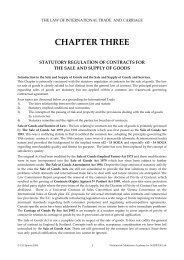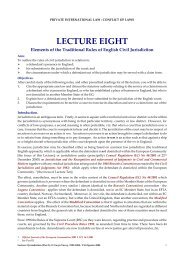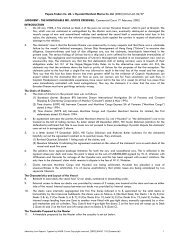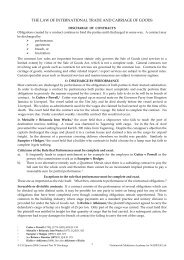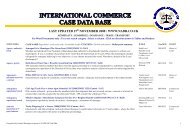Commercial Union Assurance Company plc v Simat ... - NADR
Commercial Union Assurance Company plc v Simat ... - NADR
Commercial Union Assurance Company plc v Simat ... - NADR
Create successful ePaper yourself
Turn your PDF publications into a flip-book with our unique Google optimized e-Paper software.
<strong>Commercial</strong> <strong>Union</strong> <strong>Assurance</strong> <strong>Company</strong> <strong>plc</strong> v <strong>Simat</strong> Helliesen & Eichner Inc. [1998] ADR.L.R. 10/28<br />
JUDGMENT : His Honour Judge Cresswell :QBD. 28th October 1998.<br />
1. There is before the Court an application by the plaintiffs for the following relief:<br />
1. An injunction restraining until trial or further order the second defendant (by themselves, their servants<br />
or agents) from taking any further steps to prosecute or otherwise continuing proceedings brought by<br />
the second defendant against the first to seventh plaintiffs in the Circuit Court of the State of Oregon,<br />
USA, or any other proceedings other than the proceedings herein.<br />
2. Further or alternatively, an order that the second defendant do forthwith discontinue the said<br />
proceedings.<br />
Background<br />
2. The plaintiffs are insurance companies constituting the primary and first excess layers and a proportion of<br />
the second excess layer of the global insurance cover provided to ʺReed International <strong>plc</strong>, Elsevier NV,<br />
Reed Elsevier, Elsevier Reed Finance and/or subsidiary and/or associated/related companiesʺ under<br />
policies numbered TG154930163, 551/H6A6052 and 551/H6A6552 (ʺthe contracts of insuranceʺ). The<br />
defendants are claimants under the contracts of insurance. The first defendant is a company incorporated<br />
in the State of Massachusetts, USA and is a former subsidiary of the second defendant. The second<br />
defendant is a company incorporated in the State of Massachusetts, USA and is a subsidiary of Reed<br />
Elsevier <strong>plc</strong>.<br />
The underlying action<br />
3. From about March or April 1991 the Oregon State Department of Treasury acting on behalf of the Oregon<br />
Public Employeesʹ Retirement Board (ʺOPERBʺ) retained the services of the first defendant (ʺ<strong>Simat</strong>ʺ) to<br />
advise in relation to an investment proposal*241 that had been put to the Treasury by Barclay Pacific<br />
Corporation (ʺBarclayʺ). The proposal related to a project to develop two wide body aircraft maintenance<br />
hangars at Portland International Airport in the State of Oregon. Barclay was seeking funding from a major<br />
investor to assist in the financing of the construction of the hangars, and approached the Treasury to see if<br />
it would consider investing assets in the project. The Treasury retained the services of the first defendant,<br />
inter alia, to analyse the proposal, conduct a due diligence exercise in respect of Barclay and in respect of<br />
the company which was to operate the completed maintenance facility, Pacific Aircraft Maintenance<br />
Corporation.<br />
4. From time-to-time in the period between April 1991 and June 1992 the first defendant produced reports to<br />
the Treasury further to its retainer. In June 1992 the OPERB fund invested in the project by guaranteeing<br />
US$50 million of taxable special obligation revenue bonds that had been issued by the Port of Portland and<br />
by undertaking other obligations. The proposed hangar facility was substantially completed by the<br />
summer of 1993. However, by October 1993 the facility had ceased to operate.<br />
5. On 31 October 1996 proceedings were commenced against the first defendant and others by the State of<br />
Oregon in the Circuit Court of Oregon for Multnomah County. The third amended complaint in the<br />
proceedings substituted the fund acting by its trustee as the plaintiff and alleged: (1) that in reliance upon<br />
the recommendations of the first defendant in pursuance of its retainer in June 1992 the fund guaranteed<br />
the said bonds and undertook other potential liabilities in connection with the transaction; (2) that ʺthe<br />
[first defendant] failed to fulfil its contractual obligations to the fund, made reckless or negligent<br />
misrepresentations regarding the transaction, breached its fiduciary duties and was negligent in<br />
performing its professional dutiesʺ; (3) that as a result the fund has suffered loss and damage.<br />
The <strong>Commercial</strong> Court action<br />
6. The present action was commenced by the plaintiffs for negative declaratory relief by writ dated 4 August<br />
1998. The plaintiffs then obtained on 7 August, by an order of Thomas J., leave to issue and serve a<br />
concurrent writ on the defendants out of the jurisdiction. The writ was re-issued on 12 August and served<br />
on Reed Elsevier Inc. on 18 August. On 6 October Reed Elsevier Inc. served points of defence and<br />
counterclaim, claiming indemnity under the contracts of insurance.<br />
The Oregon proceedings<br />
7. <strong>Simat</strong> and Reed Elsevier Inc. commenced the Oregon proceedings by a complaint number 98-08-05859 filed<br />
on 10 August against, among others, the plaintiffs in this action. The complaint was filed at a time when<br />
the underlying action between OPERB and the*242 first defendant was still being litigated, mediation<br />
Alternative Dispute Resolution Law Reports. Typeset by <strong>NADR</strong>. Crown Copyright reserved.<br />
1
<strong>Commercial</strong> <strong>Union</strong> <strong>Assurance</strong> <strong>Company</strong> <strong>plc</strong> v <strong>Simat</strong> Helliesen & Eichner Inc. [1998] ADR.L.R. 10/28<br />
being then scheduled for 17 August. That underlying action was settled at the mediation on or about 19<br />
August. Since then on 11 September the complaint has been amended by the first amended complaint<br />
which was filed on 11 September. <strong>Simat</strong> is not a party to the first amended complaint.<br />
Reedʹs letter on 7 October and subsequent correspondence<br />
8. In a letter dated 7 October D. J. Freeman, solicitors for Reed Elsevier Inc., wrote to Herbert Smith, solicitors<br />
for the plaintiffs as follows: We have now taken instructions upon your clientsʹ application for injunctive relief and<br />
can confirm that our client does not propose to take any further steps to prosecute or otherwise continue the<br />
proceedings brought against your clients in the Circuit Court of the State of Oregon (ʺthe Oregon proceedingsʺ),<br />
pending resolution of the proceedings in the <strong>Commercial</strong> Court (Folio No. 974), save to complete service. Should our<br />
client wish to resurrect the Oregon proceedings in the future at any time, they will only do so having given 14 days<br />
notice to you, via this firm.<br />
As you are aware, formal service of the Oregon proceedings upon your clients under the Hague Convention is already<br />
under way, but, following service, our client will take no further steps to continue the proceedings, in accordance with<br />
the terms outlined above.<br />
Herbert Smith replied on the same day by facsimile as follows: Your clients have now submitted [to] the<br />
jurisdiction of the English court and the only purpose in seeking to preserve the Oregon proceedings would be to flout<br />
the judgment of the English court in the event that it was unfavourable to your clients. Neither our clients, nor in our<br />
submission the English court, would countenance such a situation and your request is, in any event, wrong in<br />
principle. Accordingly, unless you confirm by return that your clients are taking steps to withdraw the Oregon<br />
proceedings (and in due course provide us with confirmation that the proceedings have been withdrawn), then our<br />
clients will continue to seek injunctive relief.<br />
D. J. Freeman responded on 22 October as follows: We also note the response in your fax dated 7 October 1998 to<br />
our proposals advanced in a fax earlier that day for the adjournment of your clientsʹ summons, pending resolution of<br />
the proceedings in England. These proposals were advanced in the light of our clientʹs concerns that under the terms of<br />
the settlement term sheet (copy enclosed for ease) our client may be obligated to pursue the Oregon proceedings, as<br />
OPERB is entitled to share in*243 any recovery from the plaintiffs. As you will note, paragraph 4 of the agreement<br />
provides that the coverage action may be abandoned only if our client believes in good faith that there is a 70 per cent<br />
or greater chance of an adverse ruling regarding special clause C.<br />
Our clientʹs U.S. attorneys advise that OPERB may contend that a voluntary withdrawal of the Oregon proceedings<br />
constitutes bad faith. Should the Settlement Czar concur, OPERB have the right to assume control of the action and<br />
retain two-thirds of any net recovery from the plaintiffs. Our clientʹs U.S. attorneys are also concerned that the<br />
settlement term sheet has not yet been converted into a final integrated settlement agreement, and any allegations of<br />
bad faith based on the withdrawal of the Oregon proceedings may impede the execution of the final settlement<br />
agreement. While our client cannot predict with any certainty the response of OPERB to a request for their consent to<br />
the withdrawal of the Oregon proceedings, the possibility of a negative response and the support that this may give to<br />
any subsequent arguments of bad faith should our client consent to the withdrawal of the proceedings makes such an<br />
approach inadvisable. ...<br />
In these circumstances, we would therefore urge you to reconsider with your clients their refusal to accept the<br />
proposals advanced in our letter to you dated 7 October 1998. We would add that if you agree to the proposals our<br />
client will not seek to place any reliance upon your clientsʹ delay in pursuing their claim for injunctive relief.<br />
Herbert Smith replied on 22 October by facsimile: As to our injunction proceedings, you now appear to concede<br />
that in effect your resistance thereto is merely pursuant to your clientʹs obligations under the settlement agreement<br />
and not by the way of the application of English law. In such circumstances the plaintiffsʹ application is bound to<br />
proceed and will do so.<br />
The relevant principles<br />
9. In Societe Nationale Industrielle Aerospatiale v. Lee Kui JAK [1987] 1 A.C. 871 Lord Goff said at p. 896.<br />
“In the opinion of their Lordships, in a case such as the present where a remedy for a particular wrong is available both<br />
in the English ... court and in a foreign court, the English ... court will, generally speaking, only restrain the plaintiff<br />
from pursuing proceedings in the foreign court if such pursuit would be vexatious or oppressive. This presupposes<br />
that, as a general rule, the English ... court must conclude that it provides the natural forum for the trial of the action;<br />
Alternative Dispute Resolution Law Reports. Typeset by <strong>NADR</strong>. Crown Copyright reserved.<br />
2
<strong>Commercial</strong> <strong>Union</strong> <strong>Assurance</strong> <strong>Company</strong> <strong>plc</strong> v <strong>Simat</strong> Helliesen & Eichner Inc. [1998] ADR.L.R. 10/28<br />
and further, since the court is*244 concerned with the ends of justice, that account must be taken not only of injustice<br />
to the defendant if the plaintiff is allowed to pursue the foreign proceedings, but also of injustice to the plaintiff if he is<br />
not allowed to do so. So the court will not grant an injunction if, by doing so, it will deprive the plaintiff of advantages<br />
in the foreign forum of which it would be unjust to deprive him.”<br />
In Barclays Bank Plc v. Homan [1993] B.C.L.C. 680Glidewell L.J. said at p. 701. “In my view, in relation to the<br />
circumstances of the present case, the principles to be derived from the judgment of the Privy Council in Aerospatiale<br />
can be summarised as follows: (i) If the only issue is whether an English or a foreign court is the more appropriate<br />
forum for the trial of an action, that question should normally be decided by the foreign court on the principle of forum<br />
non conveniens, and the English court should not seek to interfere with that decision. (ii) However if, exceptionally,<br />
the English court concludes that the pursuit of the action in the foreign court would be vexatious and oppressive and<br />
that the English court is the natural forum, i.e. the more appropriate forum for the trial of the action, it can properly<br />
grant an injunction preventing the plaintiff from pursuing his action in the foreign court. (iii) In deciding whether the<br />
action in the foreign court is vexatious and oppressive, account must be taken of the possible injustice to the defendant<br />
if the injunction be not granted, and the possible injustice to the plaintiff if it is. In other words, the English court must<br />
seek to strike a balance.”<br />
Each case will depend on its own circumstances. The English court is cautious in its approach when considering the<br />
grant of an injunction in respect of proceedings commenced outside its jurisdiction, such caution being applied in the<br />
interests of comity. The facts must be special if the English court is to be persuaded to grant an injunction--special in<br />
the sense of establishing both that England is the natural forum and that pursuit of the action in the foreign court<br />
would be oppressive and vexatious. In making an assessment of whether there is oppression or vexation, account must<br />
be taken of possible injustice to the plaintiffs if the injunction be not granted, and possible injustice to the defendants if<br />
it is”. See, Waller J. (as he then was) in Amoco v. T.G.T.L., unreported, 26 June 1996.<br />
10. In Pathe Screen Entertainment Limited v. Handmade Films (Distributors) Ltd, (Unreported, 11 July<br />
1989.) Hobhouse J. (as he then was) said in relation to Lord Goffʹs speech in Aerospatiale: “ ... But, reading<br />
the Opinion as a whole and having regard to the decision at which the Privy Council actually arrived, I consider that<br />
what they were doing was simply sounding two notes of caution to the application of the SPILIADA decision in the<br />
context of the grant of an injunction: first, that considerations of comity are involved which mean that it will not be<br />
appropriate to grant the injunction on ground (a) alone, (i.e. that England is the natural forum) and, secondly, that in<br />
the context of an injunction application ground (b) (i.e. that justice does not require that the action should nevertheless<br />
be allowed to proceed in the foreign court) really needs to be restated the other way round--ʺthat justice does require<br />
that the action should not be allowed to proceed in the foreign courtʺ. It is also relevant that Brett M.R. in the<br />
course of the judgment to which Lord Goff refers treats foreign proceedings as vexatious if the English claimant<br />
ʺcould get no advantage whatever by the action abroad greater than he could get by the action in<br />
Englandʺ (p. 238), a definition of vexation which is equivalent to Lord Scarmanʹs second test. I therefore conclude<br />
that the law is that I should grant the injunction if I am satisfied that in the interests of doing justice between the<br />
parties it should be granted in all the circumstances. What is the relevant natural forum is a factor to be taken into<br />
account as are the elements of vexation and oppression that are or may be involved. The discretion has to be exercised<br />
having regard to the principles of comity. It has to be exercised with caution and, as has been pointed out by Parker L.J.<br />
in M. & R. v. A.C.L.I. [1984] 1 Lloydʹs Rep. at 613, may call for a higher standard of proof than in the case of an<br />
application for a stay. I do not consider myself (pace Dillon L.J. in Du Pont No. 2 [1988] 2 Lloydʹs Rep. at 244)<br />
obliged to disregard what Lord Brandon said in the Abdin Daver, at 423: “<br />
In this connection it is right to point out that, if concurrent actions in respect of the same subject-matter proceed<br />
together in two different countries, as seems likely if a stay is refused in the present case, one or other of ... two<br />
undesirable consequences may follow: first, there may be two conflicting judgments of the two courts concerned;<br />
or, secondly, there may be an ugly rush to get one action decided ahead of the other in order to create a situation of<br />
res judicata or issue estoppel in the latter.<br />
Lord Diplock said in the same case (at p. 412), ʺcomity demands that such a situation should not be permitted<br />
to occur as between courts of two civilised and friendly statesʺ; it would be, he said ʺa recipe for confusion<br />
and injusticeʺ. As Bingham L.J. said in Du Pont No. 1 the policy of the law must be to favour the litigation of issues<br />
only once in the most appropriate forum. The interests of justice require that one should take into account as a factor<br />
Alternative Dispute Resolution Law Reports. Typeset by <strong>NADR</strong>. Crown Copyright reserved.<br />
3
<strong>Commercial</strong> <strong>Union</strong> <strong>Assurance</strong> <strong>Company</strong> <strong>plc</strong> v <strong>Simat</strong> Helliesen & Eichner Inc. [1998] ADR.L.R. 10/28<br />
the risks of injustice and oppression that arise from concurrent proceedings in different jurisdictions in relation to the<br />
same subject-matter. See further, Dicey & Morris, Conflict of Laws (12th ed.), Vol. 1, pp. 408 et seq.”<br />
The plaintiffsʹ submissions<br />
11. In his skeleton argument Mr Murray Rosen Q.C. for the plaintiffs submitted as follows:<br />
(1) England is clearly the appropriate forum for the determination of the current dispute for the following<br />
reasons.<br />
(2) The contracts of insurance, on which issues of construction arise, are governed by English law.<br />
(3) The questions of construction (and the second defendantʹs counterclaim for rectification) involve<br />
evidence from those persons principally responsible for negotiating the terms of cover, those persons<br />
residing or working in this country.<br />
(4) The second defendant has not only submitted to the jurisdiction of the English court but has also served<br />
a counterclaim seeking declaratory relief and damages. The*246 second defendant has thereby<br />
necessarily recognised and accepted that England is the appropriate forum for the determination of the<br />
dispute.<br />
(5) It would be oppressive and vexatious for the second defendant to be allowed to prosecute the Oregon<br />
proceedings or otherwise have the opportunity so to do for the following reasons.<br />
(6) The second defendant has accepted that the dispute is to be determined in the English proceedings.<br />
Given this, there can be no legitimate justification for the continuation of the Oregon proceedings. The<br />
only purpose for their continued existence would be to challenge the decision of the English court,<br />
assuming that decision turned out to be unfavourable to the second defendant. This would be an abuse.<br />
(7) The prosecution of the Oregon proceedings will cause the plaintiffs substantial prejudice in the respects<br />
set out in Mr Mehiganʹs second affidavit paragraphs 6.2-6.4 as amplified in Mr Higginsʹ first affidavit by<br />
reference to the advice of Oregon Counsel, Mr Richard Kuhn--in particular: the expense and<br />
inconvenience of a jurisdictional challenge in Oregon. The pursuit of evidential steps in the meantime,<br />
including oral depositions in Oregon. Discovery and depositions on substantive issues. The second<br />
defendantʹs demand for a jury trial.<br />
The second defendantʹs submissions<br />
12 In his skeleton argument, Mr Richard Southern for Reed Elsevier Inc. submitted as follows:<br />
In the light of D. J. Freemanʹs letter of 7 October 1998, the injunction sought is unnecessary.<br />
(1) The relief claimed is (rightly) an interlocutory injunction until trial or further order. It (rightly)<br />
contemplates that circumstances may change which may make its discharge appropriate.<br />
(2) The letter dated 7 October 1998 achieves the same objective. Unless a notice is given to revive the<br />
Oregon proceedings they will remain stayed by agreement. Furthermore, Reed have stated that they do<br />
not propose to take any further steps to prosecute or otherwise continue the Oregon proceedings<br />
pending resolution of the proceedings in the <strong>Commercial</strong> Court action. The letter therefore does not<br />
necessarily merely defer any decision on the jurisdictional issues in this matter, it may well mean that<br />
they never have to be litigated.<br />
(3) Reed has offered an undertaking to the effect set out in D. J. Freemanʹs letter of 7 October 1998. If<br />
circumstances should*247 change and a notice of intention to proceed is given, that is the time for the<br />
plaintiffs to pursue this application. The application should then be decided in the circumstances then<br />
prevailing. If the objection is that 14 days may be too short a period for the plaintiffs to respond to any<br />
such notice, then a longer period should be requested.<br />
(1) Reedʹs conduct is neither unconscionable nor oppressive. Promptly after serving points of defence<br />
and counterclaim they indicated that, apart from completing the process of service of the Oregon<br />
proceedings they proposed not to take any further steps to prosecute or otherwise continue the<br />
Oregon proceedings, pending resolution of the <strong>Commercial</strong> Court action, and stating that if they<br />
wished to resurrect the Oregon proceedings in the future at any time, they would only do so on<br />
giving 14 days notice. That conduct is not fairly susceptible of criticism and is not deserving of any<br />
injunction.<br />
(2) In such circumstances there can be no question of the plaintiffs facing a default judgment in Oregon.<br />
For Reed to seek to enter such a default judgment would be plainly inconsistent with the terms of<br />
the 7 October letter.<br />
Alternative Dispute Resolution Law Reports. Typeset by <strong>NADR</strong>. Crown Copyright reserved.<br />
4
<strong>Commercial</strong> <strong>Union</strong> <strong>Assurance</strong> <strong>Company</strong> <strong>plc</strong> v <strong>Simat</strong> Helliesen & Eichner Inc. [1998] ADR.L.R. 10/28<br />
(3) The plaintiffs are not presently in a situation where they are required to defend the Oregon<br />
proceedings and so will suffer no expense, inconvenience or injustice. Paragraphs 5-8 of Mr Higginsʹ<br />
first affidavit are all presently irrelevant in the light of the letter dated 7 October 1998.<br />
(4) There is nothing oppressive about the present circumstances whereby the interests of justice require<br />
that an injunction be granted in the form of the first part of paragraph 1 of the summons.<br />
Analysis and conclusions<br />
The natural forum<br />
13. It seems to me that the <strong>Commercial</strong> Court is the natural forum for the trial of this action. It appears to me<br />
that by virtue of Rule 186 of Dicey & Morris (12th ed.) Vol. 1. the law applicable to the contracts of<br />
insurance is English law. In reaching a view as to the natural forum, I have of course had regard to all the<br />
affidavit evidence before me.<br />
Is the pursuit of foreign proceedings oppressive and vexatious?<br />
14. Account must be taken not only of injustice to the insurers if Reed Elsevier Inc. is allowed to pursue the<br />
foreign proceedings but also of injustice to Reed Elsevier Inc. if it is not allowed to do so. In the*248 present<br />
case, as of today, it is not suggested that the dispute should proceed otherwise than in the <strong>Commercial</strong><br />
Court. See the letter of 7 October.<br />
15. It seems to me to be a fair inference from the evidence that, but for the terms of the settlement agreement,<br />
Reed Elsevier Inc. would not oppose the relief sought in paragraph 1 of the summons.<br />
16. The settlement agreement was concluded on or about 19 August, the day after these proceedings were<br />
served on Reed Elsevier Inc. (For completeness I record that there was an exchange of correspondence<br />
between Herbert Smith and D.J. Freeman prior to the issue of these proceedings.)<br />
17. It seems to me that it would be extremely surprising if there was any attempt by OPERB to dispute that a<br />
decision of the <strong>Commercial</strong> Court fell outside the terms of the settlement agreement.<br />
18. As matters stand today, the pursuit of foreign proceedings would, in my opinion, be oppressive and<br />
vexatious.<br />
19. The injunction sought in paragraph 1 of the summons is expressed to be ʺuntil trial or further orderʺ. If<br />
there is a material change of position it would in theory be open to Reed Elsevier Inc. to apply to discharge<br />
or vary the order that I propose to make. I emphasise that the policy of the law must be to favour the<br />
litigation of issues only once in the most appropriate forum. The interests of justice require that the court<br />
should take into account as a factor the risks of injustice and oppression that arise from concurrent<br />
proceedings in different jurisdictions in relation to the same subject-matter.<br />
20. I direct that this matter be restored on Friday, 6 November so that directions may be given with a view to a<br />
speedy trial or the early resolution of the dispute between the parties by other appropriate means. I would<br />
have given such directions today but for the fact that <strong>Simat</strong> is not represented before me and has not yet<br />
served a defence and counterclaim. This court is always ready to give directions with a view to the early<br />
resolution of disputes between commercial parties where there is a plain commercial need for such early<br />
resolution.<br />
21. I make an order in the terms of paragraph 1 of the summons, subject to a proviso as follows:<br />
Provided that nothing in this order shall prevent the second defendant from applying by motion to the<br />
Circuit Court of the State of Oregon for the county of Multnomah in the terms of the draft motion to stay<br />
proceedings dated 27 October 1998.<br />
22. The plaintiffsʹ application in paragraph 2 of the summons will be stood over with liberty to restore. I order<br />
accordingly.<br />
Injunction granted.<br />
Murray Rosen Q.C. and Alan Gourgey, instructed by Herbert Smith, appeared for the plaintiffs.<br />
The first defendant did not appear and was not represented.<br />
Richard Southern, instructed by D. J. Freeman, appeared for the second defendant.<br />
Alternative Dispute Resolution Law Reports. Typeset by <strong>NADR</strong>. Crown Copyright reserved.<br />
5



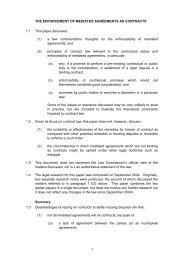
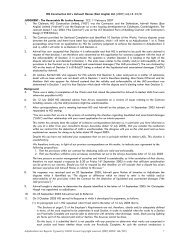
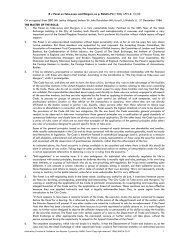
![Petrotrade Inc v Texaco Ltd [2000] Int.Com.L.R. 05/23 CA on ... - NADR](https://img.yumpu.com/12049751/1/190x245/petrotrade-inc-v-texaco-ltd-2000-intcomlr-05-23-ca-on-nadr.jpg?quality=85)
![Nicholas Drukker & Co v Pridie Brewster & Co [2005] ADR ... - NADR](https://img.yumpu.com/12033930/1/190x245/nicholas-drukker-co-v-pridie-brewster-co-2005-adr-nadr.jpg?quality=85)
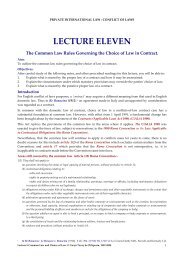
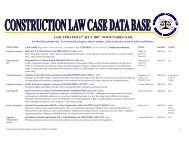
![Watkin Jones v Lidl UK GMBH (No1) [2001] Adj.L.R. 12/21 1 ... - NADR](https://img.yumpu.com/10629615/1/190x245/watkin-jones-v-lidl-uk-gmbh-no1-2001-adjlr-12-21-1-nadr.jpg?quality=85)
